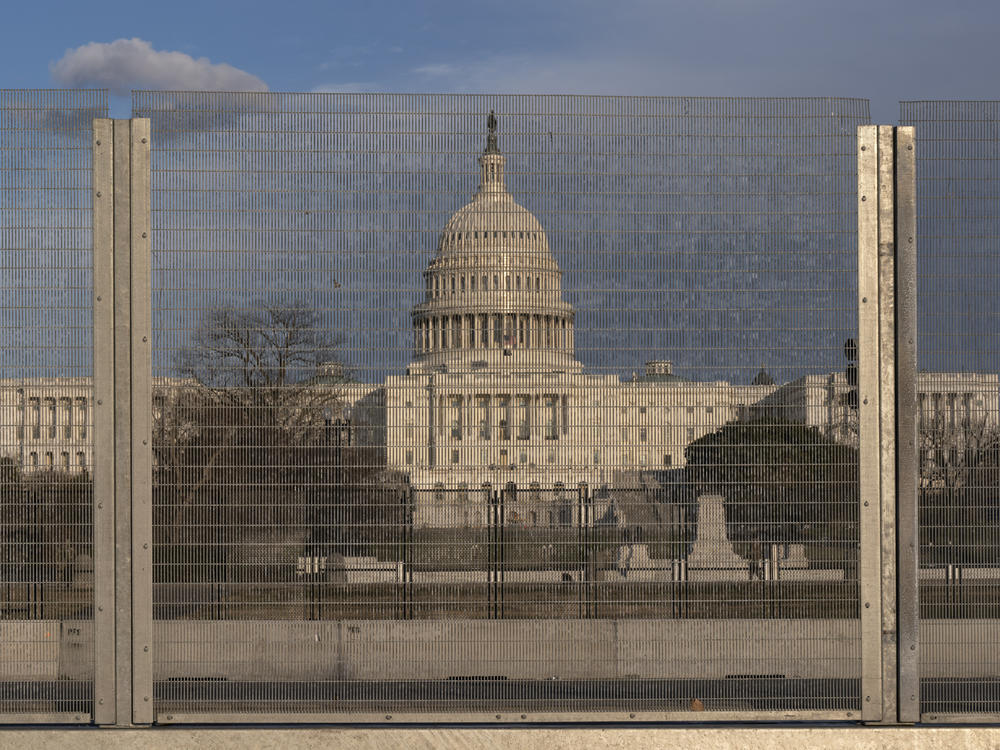Section Branding
Header Content
House Cancels Thursday Session After Police Warn Of Possible Attack On Congress
Primary Content
Updated at 5:47 p.m. ET
The House of Representatives has canceled its Thursday session after the U.S. Capitol Police said it is aware of a threat by an identified militia group to breach the Capitol complex that day.
The Senate plans to remain in session on Thursday to debate amendments to the COVID-19 relief bill.
March 4 is a significant date for far-right conspiracy theorists who believe that former President Donald Trump will return to power on that day. Presidents were inaugurated on March 4 until 1933, after which the 20th Amendment to the Constitution moved the date to Jan. 20.
The threat comes nearly two months after extremist Trump supporters broke into the Capitol, forcing lawmakers and the vice president to flee moments ahead of an angry mob. The insurrection resulted in the deaths of several people and the arrest of more than 250.
In a statement issued Wednesday, the Capitol Police, which was heavily criticized for its handling of the Jan. 6 insurrection, said it had "obtained intelligence that shows a possible plot to breach the Capitol by an identified militia group on Thursday, March 4."
The federal force charged with protecting Congress is "aware of and prepared for any potential threats towards members of Congress or towards the Capitol complex," the statement says.
"We have already made significant security upgrades to include establishing a physical structure and increasing manpower to ensure the protection of Congress, the public and our police officers," the statement says, adding that the force is "working with our local, state, and federal partners to stop any threats to the Capitol."
"We are taking the intelligence seriously. Due to the sensitive nature of this information, we cannot provide additional details at this time," the statement says.
Timothy Blodgett, acting House sergeant-at-arms, described the intelligence as "concerning" in a message to lawmakers. He said the militia group had "additional interest in the Capitol for the dates of March 4th-6th."
Meanwhile, ongoing Senate hearings have been trying to determine what led to the security lapses that resulted in the Jan. 6 riot. One focus of questioning has been the slow deployment of security personnel to the Capitol to quell the pro-Trump insurrectionists.
The D.C. National Guard's commanding general, Maj. Gen. William Walker, told Senate lawmakers on Wednesday that senior Defense Department officials took more than three hours to approve the deployment of National Guard members to the Capitol to quell the Jan. 6 insurrection.
He said then-Capitol Police Chief Steven Sund, who resigned in January amid fallout from the riot, had made a "frantic request" for National Guard troops at 1:49 p.m. But Walker said he didn't get approval to deploy them until after 5 p.m.
"We already had Guardsmen on buses ready to move to the Capitol," Walker wrote in prepared remarks to the two Senate panels that are holding hearings on the Jan. 6 insurrection.
He said that the day before the riot, unusual restrictions were placed by then-Army Secretary Ryan McCarthy on the deployment of quick-reaction forces, requiring it be approved up the chain of command. Walker said he'd "never before had that happen" in two decades of service.
Walker also corroborated testimony from Sund last week that Defense Department officials on a conference call expressed concerns about "the optics" of deploying National Guard troops.
Copyright 2021 NPR. To see more, visit https://www.npr.org.
Correction
Due to an editing error, an earlier version of this story incorrectly said the U.S. Capitol Police is aware of a threat by an unidentified militia group to breach the Capitol complex on March 4. In fact, the Capitol Police says the threat is from an "identified militia group."

